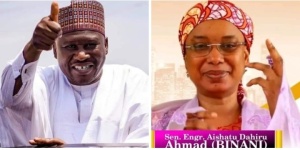On the first day of the hearing of the petition filed by the Labour Party (LP) and its presidential candidate, Peter Obi, challenging the election of President Bola Tinubu, the Presidential Election Petition Court (PEPC) admitted five exhibits as evidence. Led by Senior Advocate of Nigeria (SAN) Jubril Okutekpa, the LP presented the exhibits, marked as Exhibits PA (1 to 5), which included a copy of a United States court judgment alleging Tinubu’s conviction for drug trafficking with a fine of $460,000.
The tribunal, presided over by Haruna Tsammani, admitted these exhibits and the deposition of the first witness, Lawrence Uchechukwu Nwakaeti, on Tuesday, May 30. However, Tinubu and the All Progressives Congress (APC) objected to the admission of the judgment into evidence.
During cross-examination by Wole Olanipekun (SAN), representing Tinubu, Nwakaeti acknowledged that the judgment was not registered in Nigeria. Olanipekun further questioned the witness about the absence of any mention of a fine in the US court judgment, which Nwakaeti agreed to. However, Nwakaeti maintained that he had read the judgment in its entirety during his visit to the United States and would be surprised if the $460,000 forfeiture was not mentioned.
Under cross-examination by Lateef Fagbemi (SAN), counsel for the APC, Nwakaeti stated that the American court judgment lacked a certificate from any American police officer. He also denied being aware of a formal clearance report from the American Embassy regarding the alleged indictment and forfeiture on February 4, 2003. When Fagbemi asked Nwakaeti to provide a copy of the charges against Tinubu, Nwakaeti admitted not having one but insisted that the indictment and forfeiture arose from civil proceedings.
In a separate petition filed by the People’s Democratic Party’s (PDP) presidential candidate, Atiku Abubakar, the tribunal admitted the printout of results from the Bimodal Voter Accreditation System (BVAS) of all 36 states as evidence. Tsammani accepted the evidence in accordance with the First Schedule of the Electoral Act 2022. The court marked the evidence as PG (1-36) and PH (1-36), representing the printouts of BVAS results and Permanent Voter Cards (PVCs) from the 36 states and the Federal Capital Territory.
During the opening of Atiku’s petition, his counsel, Eyitayo Jegede (SAN), informed the court that the documents were filed at the beginning of the petitions and duly served to all parties, adhering to the legal requirements. However, counsel for the second and third respondents – Tinubu and APC – objected to the admissibility of the evidence, arguing that the documents were not submitted in accordance with the law.
The Independent National Electoral Commission (INEC) had declared Tinubu as the winner of the February 25 presidential election, with Tinubu securing 8,794,726 votes, Abubakar with 6,984,520 votes, and Obi with 6,101,533 votes. The PDP and LP candidates contested the result and approached the tribunal with separate petitions challenging Tinubu’s victory.










